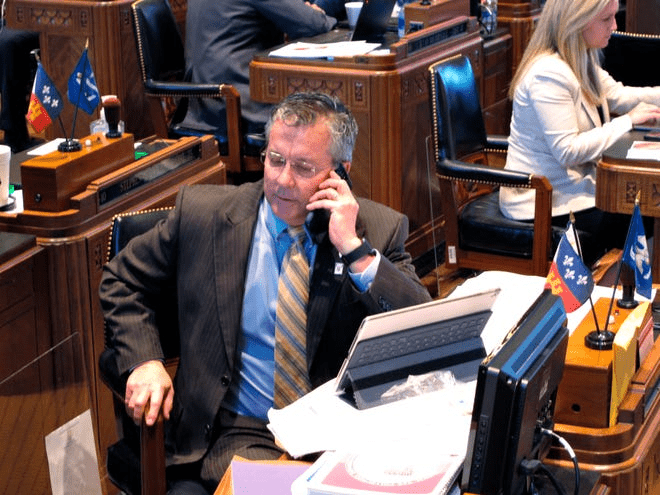
2.5.21 – Houma Today – Mark Ballard The Advocate (Baton Rouge)
Tax system revamp for Louisiana is in the works with one overall goal: lowering rates.
Though facing a nearly $1 billion revenue shortfall, a number of state lawmakers are putting together legislation that would restructure how Louisiana taxes people and businesses with an overall goal of lowering rates on income taxes.
Political leaders have been talking about the need for revamping the state’s tax system for decades. But legislators — some working independently, others working in a team — say this year’s efforts could succeed at changing the archaic structure of high initial rates but low collections because of myriad breaks and exemptions.
“People across the political spectrum can agree that Louisiana’s tax system needs a lot of help,” said Jan Moller, head of the Louisiana Budget Project, a Baton Rouge research group that advocates policies for low and middle-income people. “A lot of the ideas are no brainers. We agree in general. But it’s the details, it’s always the details.”
Traditional thinking is that tax revamps can only happen during a fiscal session, so only odd numbered years, and only in nonelection years. 2017 was a missed opportunity. 2019 was a year when all legislators and all statewide officials, including the governor, are elected. 2023 will be the next state election year. That means 2021 is perhaps the only chance for the next few years.
“All the arrows are pointing to this session for something to happen. Whether it succeeds nobody knows. Tax reform is really hard,” said Robert Scott, the head of the Public Affairs Research Council of Louisiana, a Baton Rouge policy research group known as PAR.
“I don’t have crystal ball,” said state Sen. Bret Allain II, the Franklin Republican who is part of a team putting together a package. “What I can say is that we’re going to present a well thought out plan. We’ll do the best we can to sell it.”
Some changes will require a simple majority in the House and Senate, while others will require a two-thirds vote in each chamber.
Allain, who chairs the tax-reviewing Senate Revenue & Fiscal Affairs committee, is working with Rep. Stuart Bishop, the Lafayette Republican who chairs the tax-writing House Ways & Means Committee, to come up with a package of five to seven bills to consider when the Louisiana Legislature convenes April 12.
Allain said they’re waiting for the estimates on how much money their ideas would remove or add to the state’s revenue streams.
“Our goal is to lower the income tax rate as much as we can and add stability,” said Allain. “Let’s eliminate all the deductions and loopholes, as much as we possibly can, and let’s see how low we can get the rate.”
Houma Republican Rep. Jerome “Zee” Zeringue, who as chair of the House Appropriations Committee is the chief sponsor of House Bill 1, the state’s budget for the fiscal year beginning July 1, also is working on legislation that calls for a flat income tax rate, meaning everyone would pay the same, lower rate.
“It will provide some consistency,” Zeringue said. “We need to modify and update the way the state handles its budget and make it fair and equitable. It’s sound tax policy.”
Eliminating corporate income and corporate franchise taxes — which together are projected to raise more than $500 million this year — would also require removing dozens of tax exclusions, credits and exemptions that now exist in the tax code.
Abolishing the franchise tax will be tough. Only 12 states levy a franchise tax and many of those states are in the process of phasing it out.
“It’s really not a smart tax, but it’s such a big item,” said PAR’s Scott. “I don’t see this legislature blowing such a big hole in the revenue stream, so it’s important to see how they get rid of it.”
Legislators also are looking at a tax break most states already have abolished: the ability of Louisiana taxpayers — mostly the more affluent ones — to subtract their federal tax deductions from their state tax bill. That’s worth hundreds of millions of dollars annually, though the exact amount goes up and down each year depending on federal tax law changes.
Legislators also are floating the idea of doing away with the inventory tax, which charges businesses for the products they have stored, ready to go into commerce. Only eight states continue to charge that tax and Louisiana is the only one that calculates what is owed based on the total value of the inventory. In Louisiana, local governments collect inventory taxes from businesses. The state then repays the businesses for the amount collected.
Allain has tried for years to cancel the tax and its convoluted system. Local and parish governments oppose.
“The locals don’t want to give up the revenues and they really don’t trust that we’ll will replace it in a fashion they’ll be comfortable with,” Allain said.
John Gallagher, head of the Louisiana Municipal Association, agreed.
“We’ve debated this for years,” Gallagher said. “The only way (for local governments) to keep whole will be to increase millages,” which determine how much individuals and businesses pay in property taxes.
But Gallagher said municipal and parish governments are working with state lawmakers on several administrative proposals, such as a centralized sales tax collection.
Generally, Louisiana is one of the few states where sales taxes are collected on a local level rather than on statewide level. Gallagher said local governments are looking at a procedure that would allow centralized collection while maintaining local authority.
When businesses are looking to locate a facility, Louisiana often loses out because of its tax structures, Allain argued. “Businesses look at the top line, then head to Texas or Florida or somewhere that the tax structure is less complicated.”
